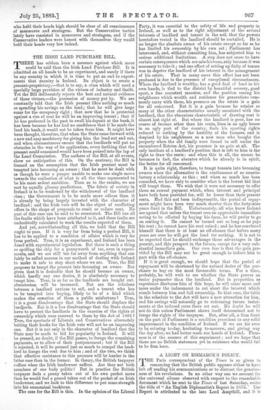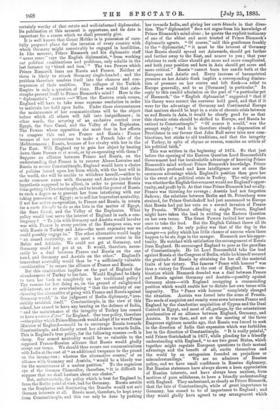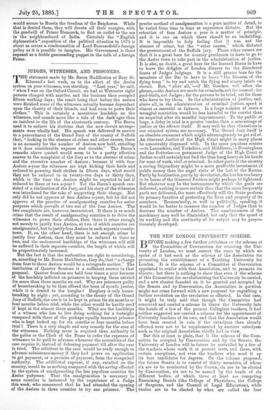A LIGHT ON BISMARCK'S POLICY.
THE Paris correspondent of the Times is so given to romancing that the British public appears either to have left off reading his communications or to distrust the genuine- ness of his revelations. In no other way can we account for the universal silence observed with respect to the remarkable document which he sent to the Times of last Saturday, under the title of "An English Diplomatist's Report in 1875." The Report is attributed to the late Lord Ampthill, and it is the world, she will be unable to withdraw herself,—either to enormous advantage which England's position then gave her make common cause with Germany and Austria (under this in the event of a political crisis in Turkey. The only question hypothesis supposed to be allies), in order to prevent Russia was whether the English Government would see England's oppor- from getting to Constantinople, and to break the power of Russia tunity, and profit by it. At that time Prince Bismarck had no ally. to such a degree as to prevent her from interfering with our France was thirsting for revenge • Austria had not forgotten taking possession of Egypt; or to sell her benevolent neutrality, Sadowa; the relations between Berlin and St. Petersburg were if not her active co-operation, to France and Russia, in return strained, for Prince Gortchakoff had just announced to Europe for a carte blanche to do as she lists in the matter of Egypt, that Russia had put her veto on a second invasion of France the Suez Canal, and the Valley of the Euphrates. What by Prussia. Without offending a single Power, England policy would best serve the interest of England in such a con- might have taken the lead in settling the Eastern Question tingency "To join with Germany and Austria would involve on her own terms. The Great Powers invited her more than war with France in every portion of the European seas, war once to take the lead. But the English Cabinet threw all its with Russia in Turkey and Asia—the most expensive war we chances away. Its only policy was that of the dog in the could possibly engage in." The other alternative would imply manger—a policy which has little chance of success when.there " an-armed neutrality, or at most a summer cruise in the happen to be six dogs in the manger. Bismarck saw his oppor- Baltic and Adriatic. We could not get at Germany, and tunity. He watched with satisfaction the estrangement of Russia Germany could not get at us. It would, therefore, neces- from England. He encouraged England to pose as the guardian sarily be a duel between France and Russia on the one of Constantinople. He let Lord Beaconsfield take the lead hand, and Germany and Austria on the other." England's against Russia at the Congress of Berlin, while he himself secured benevolent neutrality would thus be "a sufficiently valuable the gratitude of Russia by obtaining for her all the material consideration" to secure the alliance of France and Russia. fruits of her victory. The famous "Peace with honour" was suppose that we shall hesitate about our choice." of Russian interests, and have always been anxious, from But, unfortunately, the policy which is best for England is, motives of pure selfishness, to have a friendly understanding from the Berlin point of view, bad for Germany. Russia astride with England. They understand, as clearly as Prince Bismarck, on the Bosphorus and dominating the Danube would not suit that the fate of Constantinople, while of great importance to German interests at all. Russia must, therefore, be kept away Germany, has ceased to be of importance to England ; and from Constantinople, and this can only be done by pushing they would gladly have agreed to any arrangement which certainly worthy of that astute and well-informed diplomatist. her towards India, and giving her carte blanche in that direc- Its publication at this moment is opportune, and its date is tion. The" diplomatist " does not argue from his knowledge of important for a reason which we shall presently give. Prince Bismarck's mind alone ; he quotes the explicit testimony It is well known that Count Moltke is in possession of care- of one of the ablest and most trusted of Prince Bismarck's fully prepared plans for the invasion of every country with diplomatic agents. " Of course," said this gentleman frankly which Germany might conceivably be engaged in hostilities. to the " diplomatist," " it must be the interest of Germany In like manner, Prince Bismarck and his diplomatic staff that Russia should spread out Asiawards, should get farther " never cease," says the English diplomatist, " from working and farther away to the East, and nearer to you ; that your out political combinations and problems, only soluble in the relations to each other should get more and more complicated, last instance by 4 blood and iron.' " The two Powers which and both your position and hers in Asia should get more and Prince Bismarck fears are Russia and France. Neither of more critical." Russia " cannot burn her candle both at the them is likely to attack Germany single-handed ; and the European and Asiatic end. Every increase of barometrical problem therefore resolves itself into the chances and con- pressure on her Asiatic flank implies a corresponding diminu- sequences of their coalition. The collapse of the Turkish tion of pressure on her centre and left flank—a relief to Empire is only a question of time. How would that cata- Europe generally, and to us [Germans] in particular." In strophe present itself to Prince Bismarck's mind ? Here is the reply to this candid admission on the part of " a particular pet 44 diplomatist's " answer :—" When the Eastern crash comes, of Bismarck," the 46 English diplomatist " suggested " that if England will have to take some supreme resolution in order his theory were correct the converse held good, and that if it to maintain her hold upon India. Under these circumstances were for the advantage of Germany and Continental Europe the maintenance of her communications will be the object that matters should be kept in a state of chronic crisis between before which all others will fall into insignificance ; in us and Russia in Asia, it would be clearly good for us that other words. the securing of an exclusive control over this chronic crisis should be shifted to Europe, and Russia be Egypt, the Suez Canal, and the Valley of the Euphrates. enticed to Constantinople." " Of course it would," was the The Powers whose opposition she must fear in her efforts prompt reply ; " and it is therefore clearly a dispensation of to compass this end are France and Russia : France Providence in our favour that John Bull never tries new corn- because of her pretensions to make a French lake of the binations, but sticks to old traditions, and that the integrity Mediterranean ; Russia, because of her rivalry with her in the of Turkey, in spite of rhyme or reason, remains an article pf Far East. Will England try to gain her object by beating his political faith." down those Powers vi et arznis, or by co-operating with them ?" This was written in the beginning of 1875. So that just Suppose an alliance between France and Russia, on the before the opening of the Eastern Question Lord Beaconsfield's understanding that France is to recover Alsace-Lorraine and Government had the incalculable advantage of knowing Prince Russia to secure Constantinople, England would have a choice Bismarck's mind without Prince Bismarck's knowledge. Prince of policies forced upon her from which, with the best will in Bismarck's profound and keen intelligence saw at once the But this combination implies on the part of England the thus a victory for Prussia at the cost of England. The corn- abandonment of Turkey to her fate. Would England be likely bination which Bismarck dreaded was a duel between France to turn her back so completely on her traditional policy and Russia against Germany and Austria—possibly against The reasons for her doing so, on the ground of enlightened Germany alone—with England occupying a commanding self-interest, are so overwhelming "that the certainty of our position which would enable her to dictate her own terms with choosing the alternative of going with France and Russia against impunity. The "Peace with honour" completely changed Germany would," in the judgment of Berlin diplomacy,"irre- the situation. Austria was forced into the arms of Prussia. sistibly establish itself." Constantinople, in the view of this The seeds of suspicion and enmity were sown between France and school, has ceased to have any bearing on the defence of India, England by the clandestine acquisition of Cyprus and the Dural and the maintenance of the integrity of Turkey has ceased Control in Egypt, and most of all, perhaps, by the ostentatious to have a raison d'être" for England. Our true policy, therefore proclamation of an alliance between England, Germany, and —the policy whichPrinceBismarck would adopt if he werePrime Austria. It was then, and not at the meeting of the three Minister of England—would be to encourage Russia towards Emperors eighteen months ago, that Russia was forced to seek Constantinople, and thereby arrest her advance towards India. in the direction of India that expansion which was forbidden This is England's true policy, for the following reasons :—It is her in the direction of Constantinople. "It is really painful," cheap. Our armed neutrality would be so valuable to the said Prince Gortchakoff in 1877, while pleading for a friendly supposed Franco-Russian alliance that Russia would gladly understanding with England, "to see two great States, which accept our terms. We should thus secure our communications together might regulate European questions to their mutual with India at the cost of "an additional twopence in the pound advantage and the benefit of all, excite themselves and on the income-tax ; whereas the alternative course," of an the world by an antagonism founded on prejudices or ' alliance with Germany and Austria, "would be a bloody war misunderstandings." We are no admirers of Russian for the maintenance of a useless position." To the sagacious policy, and we have small confidence in Russian diplomacy. eye of the German Chancellor, therefore, "it is difficult to But Russian statesmen have always shown a keen appreciation would secure to Russia the freedom of the Bosphorus. While that is denied them, they will devote all their energies, with the goodwill of Prince Bismarck, to find an outlet to the sea in the neighbourhood of India. Certainly the "English diplomatist's" exposition of the political situation in 1875 is about as severe a condemnation of Lord Beaconsfield's foreign policy as it is possible to imagine. His Government is there exposed as a feeble gasconading puppet in the toils of a foreign Power.




































 Previous page
Previous page